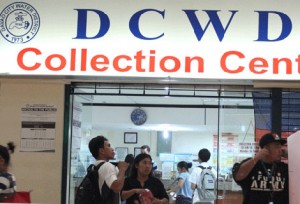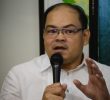
WATER RATE HIKE. Davao City’s water district imposes 30 percent increase in its rates starting February. Said increase will be implemented in increments of 10 percent within three years or until 2014. (davaotoday.com photo by Medel Hernani)
The new water rates would set the minimum monthly charge for residential or non-business clients at PhP 114.40 (US$ 2.65) per ten cubic meters, PhP 125.80 (US$ 2.91) in 2013 and PhP 138.40 (US$ 3.20) in 2014. These figures would be higher for commercial establishments. Each increase would effectively trigger a domino effect that would cause the prices of food — and other enterprises involving water — to shoot up.
By CJ KUIZON
Davao Today
DAVAO CITY, Philippines — Unbottled and plentiful water in the city is not cheap anymore, much to the dismay of residents, who have always been assured of having the most inexpensive water in the country.
Clean water now comes at a higher price, if one gleans from the letter of Davao City Mayor Sara Duterte to the Davao City Water District (DCWD) Board of Directors (BOD) chairperson Eduardo Bangayan.
The BOD headed by Bangayan, a long time close ally of the Dutertes, recently announced a 30 percent increase in water rates. Upon Mayor Sara Duterte-Carpio prompting, the BOD agreed to spread the increase over a period of three years. In her letter, Duterte-Carpio also said she “understand(s)” the necessity for an increase so that the DCWD could “carry out (its) mandate of making available to the Dabawenyos
quality water supply necessary for their everyday needs.”
Loretta Lorenza, 57, a long-time vendor in Bankerohan Public Market and a mother of five, was aghast with this news. “Why would the water rate go up again when we’re already having a difficulty paying our current bill!,” Lorenza said, pointing out they would really have a hard time with this new increase because her income has been steadily declining and is barely enough to meet their basic needs.
The new rates would set the minimum monthly charge for residential or non-business buildings at PhP 114.40 (US$ 2.65) per ten cubic meters, with one cubic meter having an approximate volume of five ‘drums’ or barrels. The minimum charge next year would then go up to PhP 125.80 (US$ 2.91) in 2013 and to PhP 138.40 (US$ 3.20) in 2014. These figures would be higher for commercial establishments. Each increase would effectively trigger a domino effect that would cause the prices of food — and other enterprises involving water — to shoot up.
Expansion or loan payment?
The initial statement released by acting manager Edwin Regalado said the water rate hike is needed for infrastructure development or expansion projects and to meet rising operational costs.
However, later interviews given by DCWD spokesperson Imelda Magsusi focused on improvement of facilities, like the 20,000 connections, for drilling, storage and pipeline installation. Magsusi said Cabantian village, a big barangay in Davao City’s second district, needs PhP 384.5 million (US$ 8.89 million) while Barangay Panacan needs PhP 456.5 million (US$ 10.56 million)to complete its pipeline system. She also said the increase in water rates was a way to recover their losses from water pilferages.
The DCWD employees union says that another reason why the BOD would want an increase is that they need to pay off a PhP 126-million (US$ 2.91-million) loan that they took out from Local Water Utilities Association (LWUA) last 2007 under the Comprehensive Mainline Replacement Program. This was to supplement the PhP 360 million (US$ 8.31 million) worth of pipeline system in 2000 or the ‘Phase 3’ project that was the supposed reason for a 60 percent increase at that time.
DCWD union chairperson Rudy Aranjuez again raised the issue of return of investment (ROI) from this multi-million project, a question that the union had asked in 2005 — still without any clear answer. “We wondered at the time why there was a need for another increase when (the DCWD) had just completed the Phase 3 project,” Aranjuez said. “Where is the ROI from this project?”
Franchie Buhayan, Bayan-Southern Mindanao secretary general, said a water rate increase would be unjustified given that it has a substantial profit margin. “The DCWD is earning well and does not really need to increase its rates. Any increase (in water costs) is unjust, especially that there is no substantial increase in wages for workers who comprise most of the water consumers,” Buhayan said.
The DCWD had declared an income of PhP 70 million (US$ 1.62 million) in 2011, “an amount that seems small,” scoffs Aranjuez. He cites that the 2000 Phase 3 projects, having been worth hundreds of millions of pesos, should have earned enough, that an increase in the rates this year would be unnecessary.
No consultations
Buhayan added that instead of acquiescing to DCWDs interest, Mayor Duterte-Carpio should have demanded for a public consultation and public hearing.
Vendor Lorenza took this one step further and said what was even better was if the mayor asked the DCWD to find a way to lower the water rates instead of increasing them. She also questioned why there seemed to be no information drive and consultations regarding the DCWD’s move.
Magsusi had earlier said there was no need for the public consultations as those were already done when DCWD bid for a 60 percent increase in 2005. This increase was cut in half after Vice Mayor Rodrigo Duterte, who was then the Davao City mayor, intervened.
Buhayan, however, said that the public has a huge say over the affairs of the DCWD, it being a government-owned and controlled corporation. She said even the Local Water Utilities Administration, which approved this increase, could be made accountable for this lapse in procedure. Public consultation is a necessary requirement before increases can be implemented.
Aside from addressing the lack of proper consultation, BAYAN also challenged the mayor to look into the reports of “excess allowances, bonuses, expenses of the Board (of Directors).”
In 2005, the year when the DCWD asked for a 60 percent increase in their rates, its BOD members were embroiled in an issue of corruption and overpayment. However, cases were filed only against management officials.
Then general manager Engr. Wilfred Yamson and assistant general manager Alfonso Laid were relieved of their positions. Yamson, however, had already retired by the time the decision for their termination came out. It is not known whether he wrongfully received retirement benefits. Also relieved were the managers of the audit department, the legal department and the engineering division.
No member of the BOD was sanctioned because no cases were filed against them. The backlash was felt by the DCWD union instead. In 2007, Aranjuez was terminated from DCWD and was only reinstated after several months of vigorous campaigns. (CJ Kuizon/davaotoday.com)
davao city water district, utilities, water, water rate hike









